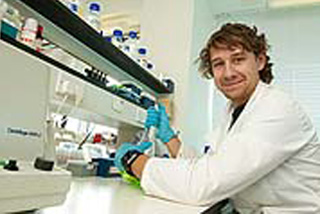
The team has seemingly found a lab technique to overcome the resistance of breast cancer stem cells to a specific drug. This finding paves the path to a permanent probability of impeding the cells from forming more tumors. It also highlights the vitality of cancer stem cell research. PhD student Luke Piggott is the lead author of the research and is a well-known ice hockey player too.
Cancer stem cells are found in a small area of the tumor but they supposedly play a major role in the progress of the condition and are also known to show resistance to therapies. This research seems to have made these cancer stem cells reactive to the anti-cancer agent TRAIL that is presumably opposed by a protein called c-FLIP present in cells. The technique appears to have repressed the action of this protein which seems to have resulted in a 98% drop in secondary tumors. In case these stem cells reappear, a repeat treatment is touted to discard them.
Luke’s supervisor, Dr Richard Clarkson of the School of Biosciences, shared, “We believe we have found a crucial ‘Achilles heel’ in breast cancer stem cells. We can almost completely shut down their ability to spread the disease through the body through secondary tumours. Our success with repeat treatments is also important, offering hope that we can reduce relapse rates of the disease.These are very promising results but so far we have only seen this method work on cells in the laboratory. We need a lot more work to establish how best to suppress C-FLIP in patients and whether this can eliminate cancer stem cells in tumours in the breast.”
As per Alan Clarke, Director of the European Cancer Stem Cell Research Institute, Luke’s outcomes suggest a primary role played by cancer stem cells in the development of breast cancer. Successful elimination of cancer stem cells is what is the foremost objective for treatment, he added. The final objective of the research is to conduct human clinical trials using this method.
The findings are published in the journal Breast Cancer Research.
